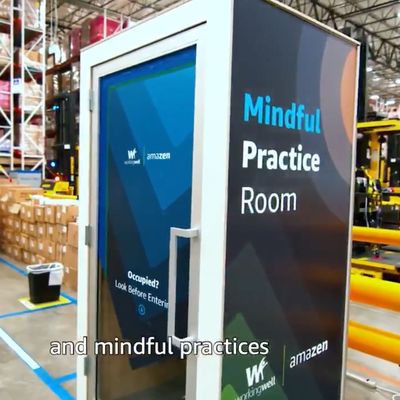
Mindfulness is gaining popularity in the workplace, a way for employers to quell worker unrest. They won’t pay living wages or improve benefits or standardize hours, not when it’s easier to host meditation sessions or install a “Zen booth” as Amazon has done. Vice News reports that inside the AmaZen booth — not much larger than a refrigerator — a computer guides workers through “mental health and mindful practices.” There is a skylight, and plants, and perhaps most useful to the workers, a fan. In fact, it seems likely that the fan will be the biggest draw, with its promise of cooler air and a few minutes’ respite from warehouse labor.
The booth invites comparisons to all kinds of science-fiction dystopia and it’s tempting to indulge the impulse. Dystopias, however, are worlds that do not exist. Amazon is real, and so are its working conditions. A person who looks at the booth and says, “This is so Black Mirror,” really means to say that they are frightened. Something has gone terribly wrong, in a way that can feel final. It can be difficult to admit that this is simply how we live now. Amazon can crush unions and work its employees to exhaustion, and still carry on as normal. The ZenBooth is not proof that Amazon has become kinder, or more employee-conscious. It is evidence of something else altogether: Amazon will not listen to workers at all.
Workers have been clear in their demands. They haven’t asked for a meditation, but time to use the bathroom. They want job security, regular schedules, and freedom from surveillance. Amazon, a trillion-dollar company, has the power to grant these demands but it refuses, choosing instead to fire workers who try to organize. Without much of a check on its power, Amazon enjoys license to do roughly as it pleases.
Possibilities abound. No need to stop at a ZenBooth when there are so many ways to help employees.
Perhaps a little robot can deliver a mild electric shock in the middle of workers’ exhausting megacycle — sorry, Single Cycle — shifts. Or nap pods, cleverly arranged in a dormitory layout, so that workers never have to leave the site at all. A vending machine could dispense catheters and thus reduce the time workers must spend in the bathroom. And when a worker finally reaches the point of exhaustion, a conveyor belt could deliver a replacement. Human beings are a problem for innovation to solve! Amazon certainly has the resources to imagine new and exciting horrors for everyone. With time and a bit of hard work, it can create a reality so strange and inhuman that no written dystopia would compare.
AmaZen is the product of a bet. Amazon believes that it can continue to ignore workers and little will happen. Cities desperate for jobs will still beg for warehouses. People will still sign up to work, motivated by the promise of a $15 minimum wage. Until cities wise up, and public authorities crack down, it will fall to workers to hold Amazon accountable. Wealth and power will take a company far but even they have their limits. Ignoring workers can backfire. If Amazon thinks mindfulness can avert future walkouts or union drives, it’s mistaken; the ZenBooth is no replacement for material change. Although matters have indeed gone wrong, nothing is final. The ZenBooth doesn’t look all that sturdy, and sometimes, neither does Amazon itself.






























